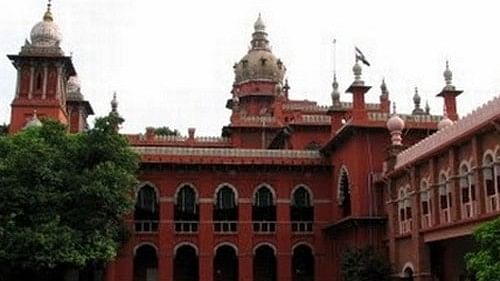
The Madras High Court.
Credit: PTI File Photo
Chennai: The Madras high court, dismissing a petition filed by state BJP President K Annamalai on Thursday to quash the summons issued to him in a case, expressed the opinion that the psychological impact on an individual or a group must also be considered under the definition of hate speech.
Justice N Anand Venkatesh made this observation while dismissing Annamalai's petition, in which he sought the quashing of the summons issued by a magistrate in Salem.
The summons had been issued based on a complaint by a person named V Piyush, who accused Annamalai of making a hate speech against Christians in an interview to a YouTube Channel on October 22, 2022, with regard to the bursting of crackers, just two days before Diwali.
Arriving at his observation, the judge noted that Annamalai had given an interview to a YouTube channel, whose runtime is nearly 44.25 minutes, a 6.5-minute extract of which was shared on the BJP's twitter handle on October 22, 2022. This date is significant as it was just two days before Diwali, the judge added.
The content of the message was that there was an internationally-funded Christian Missionary NGO that is allegedly involved in completely destroying Hindu culture by filing cases in the Supreme Court to prevent Hindus from bursting crackers.
Prima facie, the statements disclose a divisive intent on the part of the petitioner to portray a Christian NGO as acting against Hindu culture, the judge said.
The intent can be inferred from the timing of the statements, made two days before the festival of Diwali, the judge added, saying it was also evident from the fact that this particular extract of the interview was culled out from the main interview and shared on the twitter handle of the BJP.
Justice Venkatesh said the petitioner, having formerly been a senior IPS officer and the current president of the BJP state unit in Tamil Nadu, was expected to know the laws of the land. Moreover, being a well-known leader and mass influencer, he would have been aware that his statements would have a wide reach and influence on the people, particularly those belonging to the Hindu religion, the judge said.
The target of Annamalai's speech was a particular religious group and what they were told by him was that the minority religious group was attempting to destroy the culture of the majority religious group, the judge further pointed out.
It is clear that there exists a prima facie intent to create hatred towards a particular religion, the judge asserted saying, "These statements were made by a person of stature, whose words have a lot of impact on the masses and, as a result, they, prima facie, have a psychological impact on the targeted group."
Stating that the petitioner's counsel would argue that there was no material to show that the statements made by his client created enmity or hatred or ill-will or disturb public tranquility, the judge cited the significance of the Supreme Court decision in the case of Pravasi Bhalai Sangathan.
The apex court made it very clear that every such hate speech need not immediately result in violence or disturbance to public order and that it can have various impacts on the group to which such statements are aimed at, he recalled.
The Supreme Court warned that such statements can act like a ticking bomb, which would wait to explode at the appropriate point of time by creating violence, and in the most extreme cases, even lead to genocide. These observations are more relevant in this social media era, Justice Venkatesh said.
Noting that the twitter handle in which the shortened and focused version of the speech had been posted is a permanently available record of the data, he pointed to the possibility of it being used at an appropriate time, to be circulated. 'The ticking bomb will have its desired effect at that point of time,' he cautioned.
The psychological impact of a statement made by a popular leader must not merely be confined by testing it only on the basis of immediate physical harm, the judge said, adding that it is the duty of the court to see if it has caused a silent harm in the psyche of the targeted group, which, at a later point of time, will have its desired effect in terms of violence or even result in genocide.
Therefore, the 'non-physical impact of the statements made' will also come within the scope of Section 153A of the IPC (promoting enmity between groups), the judge added.